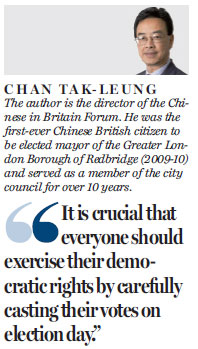Fairness and transparency should always prevail during SAR elections
Updated: 2016-06-29 08:41
By Chan Tak-Leung(HK Edition)
|
|||||||||
The Sixth Legislative Council (LegCo) election will be held in Hong Kong on Sept 4. A total of 70 members will be elected to serve a four-year term. When one compares the impending election in Hong Kong to Britain's recent referendum on its membership of the European Union, both are of equal importance and significance. These are events that will change the course of history and the future prospects of many citizens.
It is therefore vitally important for Hong Kong's eligible electorate to understand that their votes really do matter. Going out to vote is one of the rights enshrined in the Basic Law. It is crucial that everyone should exercise their democratic rights by carefully casting their votes on election day. The membership of the new LegCo may either deliver a positive or negative impact to the political, administrative and economic stability of Hong Kong. This will ultimately deliver a secure and prosperous outlook (or the opposite) for everyone concerned.
Under "One Country, Two Systems" policy and the Basic Law, electorates in Hong Kong have continued to enjoy their democratic rights to make their own decisions in choosing individuals who will represent them in the new legislature. This is despite the fact universal suffrage was not voted in last year. Before people cast their votes, potential legislators must ensure their campaigns are fair and transparent. Election campaigns ultimately need funding. Candidates and their parties must therefore ensure that the incomes and spending for election campaigns are open and transparent. They must exercise control over the sources of political funding for either themselves or their parties, while the amount spent must not exceed the limits allowed.
Surely one would argue that there is already the independent, impartial and apolitical Electoral Affairs Commission (EAC) to ensure local elections are conducted "openly, fairly and honestly" at all times. However, unlike the Electoral Commission in Britain, the EAC's main tasks are to review and make recommendations on constituency boundaries and to deal with elector registration. The conduct of public elections, unfortunately, is much lower on the agenda for the EAC as demonstrated by its consultation earlier in the year. Maximum election expenses, financial assistance, advertising and media impartiality were mentioned, but the emphasis was on voter registration.
The Electoral Commission in Britain has established guidelines on electoral registration, elections and referendums, and it also publishes very clear advice for candidates and agents. For candidates, it clearly defines who can stand for election, spending and donations, campaigning, attending electoral events and what happens after results are declared.
There are some "no go" areas for candidates and their agents, according to the Electoral Commission guidelines, which one believes have equal importance for candidates and agents in Hong Kong during the forthcoming LegCo election. For example, it is against the rules for candidates to knowingly make a false statement about the personal character of another candidate. It is also an offence to pay canvassers. While candidates have the right to use schools and rooms for public meetings, it will be against the rules to use school premises during school hours. Planning rules must be complied with for advertising and large banners. Candidates are not allowed to produce materials that look like the poll cards sent to voters or pay people to display adverts.
Bribery, treating voters before, during or after an election directly or indirectly with food, drink, entertainment, impersonating someone to vote and making false statements of another candidate and malpractice are electoral offenses punishable by law. Funds raised for campaigns in Britain are spent mainly on advertising, market research, canvassing, rallies and other events, transport, administrative overheads, campaign broadcasts, media and developing manifestoes.
Like most Western democracies, political parties in Britain receive donations from businesses, trade unions and individual supporters. All these donations are clearly declared in returns to the Electoral Commission to ensure transparency. Political parties, at the same time, organize receptions, dinners and raffles throughout the year to raise funds for forthcoming elections. Supporters and candidates who participate in these events have to pay for the privilege to take part. At the start of the election period, all activities need to cease to ensure candidates will spend within the financial limits allowed by the rules.
There are numerous parties in Hong Kong but there is no legal definition for these parties. They are either registered as limited companies or societies. Nonetheless all political groups must observe best practice and follow the relevant guidelines.
One also hopes all potential candidates will take their oaths seriously when taking office. They will be required to uphold the Basic Law, to bear allegiance to Hong Kong and to serve the region conscientiously and dutifully in full accordance with the law. Reflecting on incidents of absenteeism, non-attendance of meetings, filibustering, unruly conduct and disrespectful behavior to the LegCo president over recent years in the legislature, perhaps some people should think twice before entering the race.

(HK Edition 06/29/2016 page15)